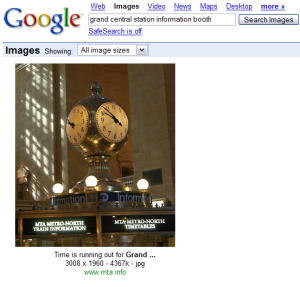 Search is a game. It’s a language game, it’s a coordination game.
Search is a game. It’s a language game, it’s a coordination game.
This thought over coffee and oatmeal this morning with my economist friend Paul Ramer. He told how he was searching for how to do something in Excel. We decided there are 2 important steps here.
- Is this something someone else would have encountered and written about?
- What words would they have used in their account?
Anyone who’s been on the web for more than an hour has realized that the answer to question 1 is always “yes”. The challenge and the skills are in question 2.
This got me thinking of Wittgenstein’s Language Game, the concept that language is a sort of game where the players both “win” when they agree on standard words. If I refer to this thing as a “stuhl” and you call it a “chair”, we’re going to have a hard time communicating about those things. We both lose. (Especially I was looking to buy one and you were looking to sell one!)
Perhaps a more accurate description is to call it a Coordination Game. In a famous study in 1958, Thomas Schelling asked a group of university students a simple question: “You have to meet someone in New York City at a certain time, but you don’t know where, and you can’t contact them ahead of time. Where would you go to meet them?” Amazingly, over half of the students chose the exact same place: the information booth at Grand Central Station. Out of all the million places in New York, a majority chose one place.
So when Paul was looking for help with Excel, the game unfolded thus: He has to think of “What would other people write if they were talking about this problem?”. That’s what is so damn fascinating! Having to project yourself into the shoes (and minds) of everyone else and guessing what they would do. The game is easy for things like “britney spears pictures”, but harder for things like “thomas schelling meeting place grand central study“. (That’s the search term that won it for me after about 20 iterations.)
So it’s no accident that Google’s magnificent Image Labeler Project is in fact a game. (A game so addictive that they’ve but it stops that will prevent someone from playing for longer than 10 hours, according to some folks at the recent ICWSM conference!)
One last point on the money side: this is also the game which [malicious] keyword advertisors seek to subvert. When you buy a popular keyword (e.g. “britney spears”) but your content has nothing to do with her, then the searcher loses. They lose because they had to pay attention (which is a real cost) to an ad that wasn’t relevant. One beauty of AdSense is that it too is a game, with rules that penalizes such ads. Ads that dont’ generate enough clickthroughs won’t get shown as often. Yahoo ads didn’t have this feature until the recent release of Panama.
 That’s a lot of ideas from one breakfast!
That’s a lot of ideas from one breakfast!
If you’re around: I’ll be at the Boulder Denver New Technology Meetup tonight. This month we’re at the new Denver Art Museum, an awesome structure designed by Daniel Libeskind. Come by and say hello!
Stan,
It’s a very good post but I think the overview could be complteted with the ESP Games. especially because ESP Games has proved to have very good side effects.
Coordination is the basis of Human Computation.
I am working on an update for my Virtual identity puzzle (Yahoo Barcamp in Paris @ the end of the week) And I will add lijiit in it.
thanks for your great inputs.
Leafar
Your Virtual Identity Puzzle is fantastic! (I’m a sucker to for charts like that.)
I’m off to watch the human computation video now. Looks interesting.